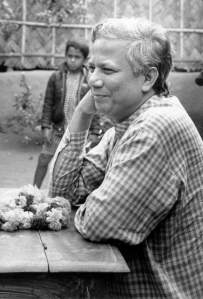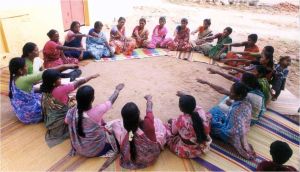A network of people who support Grameen Bank and its founder, microfinance pioneer Professor Muhammad Yunus, has put together a short, factual summary of the recent confrontation between Professor Yunus/Grameen Bank and the Bangladesh government. It’s meant to be a quick read that will help people separate fact from fiction, with plenty of links to key documents for those who want to dig deeper. There has been much misinformation circulated in the media and around the web about these issues, so we hope this will prove to be a reference that people can easily share, to enable supporters of microfinance to spread the truth. This fact sheet will be updated as conditions change; to read, share or download the most recent version of this fact sheet in PDF format, visit the Friends of Grameen website.
The international media recently has been full of stories and speculation about Professor Muhammad Yunus and Grameen Bank, joint recipients of the 2006 Nobel Peace Prize for their work fighting poverty. Because of false accusations against Professor Yunus and the Bank – including emails and other materials widely distributed by Sajeeb Wajed, the son of Bangladeshi Prime Minister Sheikh Hasina Wajed, as well as by other government officials – many of the stories were inaccurate and confused. Though Grameen Bank has responded to these allegations through the media and other means, unfortunately this disinformation campaign has continued, so we feel that it is necessary to create this fact sheet, which contains a quick review of the events as they’ve happened, as well as resources for those who want to know the truth.
In late November 2010, a Norwegian television network aired a documentary called “Caught in Micro Debt” that made a number of false accusations about Professor Yunus and Grameen Bank. For example, it said that funds received from a Norwegian aid agency, NORAD, were improperly transferred between Grameen Bank and Grameen Kalyan, its non-profit sister organization. This matter was clarified and settled between NORAD and Grameen Bank in 1998. After the documentary aired, Norway promptly investigated the transaction again, and again said there was no improper use of funds.
The documentary also claimed that Grameen Bank charged from 30% to 200% interest, but a study of Grameen Bank’s interest rates by leading authority MicroFinance Transparency noted that “Grameen has an extremely simple and transparent pricing system,” while a report by the Review Committee appointed by the government (see below) to examine the Bank noted that it has the lowest interest rates of any microfinance institution in Bangladesh, with 20% being its top rate.

Even though Prof. Yunus has resigned his post as Managing Director of the bank he founded, the Bangladeshi government has continued to pursue efforts to take over Grameen Bank, and even to take control of unrelated social businesses that share the Grameen name.
Even so, the Bangladesh government – led by Prime Minister Sheikh Hasina Wajed, who reportedly has viewed Professor Yunus as a political rival since he looked into setting up a political party in 2007 – led a campaign to force Professor Yunus from his post as managing director of Grameen Bank, with the 77-year-old finance minister, Abul Maal Abdul Muhith, claiming that the 70-year-old Yunus was “too old” for his post. At a press conference following release of the documentary, the prime minister stepped up the rhetoric, accusing Professor Yunus of “sucking blood from the poor in the name of poverty alleviation.” Other officials of her government, including the Foreign Minister, the Agriculture Minister, top Awami League officials and special advisors, made repeated false allegations and personal attacks against Professor Yunus.
Muhith repeatedly asked for Yunus’s resignation, but Professor Yunus declined, reminding Muhith that – according to the Grameen Bank Ordinance of 1983 – only the Grameen Bank Board of Directors had the right to hire or fire the managing director, since the Bank is an independent entity. (The Bank’s board comprises 13 people, three of whom – including the chairman – are appointed by the government, with nine being elected by the Bank’s 8.3 million borrower-owners, and the managing director as the remaining member.) The government then stepped up the pressure by appointing a disgruntled ex-employee and vocal critic of Professor Yunus, Muzammel Huq, as chairman of the Grameen Bank Board in January.
In early March, the Bangladesh Bank (backed by the Finance Ministry) informed Grameen Bank that Professor Yunus had been acting as managing director without its consent, which it claimed was a violation of its rules. The letter also cited his age as a factor, and called on the Board to take appropriate action. Grameen Bank immediately responded to these allegations, showing that the Bangladesh Bank had given express approval of his appointment, and that his appointment had been extended formally and indefinitely. Professor Yunus and the nine independent Directors then began a legal process to declare the letters invalid. After the country’s High Court summarily dismissed the petition, the petitioners turned to the Appellate Division of the Supreme Court, which in early May also dismissed the petition, despite well-reasoned and impassioned arguments from Grameen Bank’s attorneys.
Grameen Bank has fully cooperated with a Review Committee set up by the Bangladesh government to examine the Bank’s operations. The Review Committee’s report, submitted to the Finance Ministry in late April, confirmed that there was no wrongdoing involved in the transfer of Norwegian aid funds, and acknowledged that Grameen Bank’s interest rates are the lowest in the country. The Committee found no evidence of mismanagement or personal corruption among Grameen Bank employees, complimented Bank staff on their cooperation, and acknowledged the tremendous contributions made by the Bank on the country’s socio-economic condition. However, the Committee’s incorrect assumptions that Grameen Bank is a “government bank” and other incorrect findings prompted a detailed refutation by Grameen Bank.
On May 12, Professor Yunus announced he resigned from his post as managing director of the Bank, handing the position to Deputy Managing Director, Nurjahan Begum, while the Board conducts a search for a permanent replacement. In a letter to his colleagues at the Bank, as well as a letter to the Bank’s borrower-owners, he emphasized the importance of maintaining the Bank’s independence, which the government is threatening to take away.
Professor Yunus has worked tirelessly to create other independent social businesses committed to promoting social good. It now seems as if the government is now looking to take control of these enterprises, too.
Throughout this period, a network of supporters inside and outside of Bangladesh – millions of everyday people, as well as well-known politicians, diplomats and business leaders – have contributed their time and effort to protect the reputation of Professor Yunus and the independence of Grameen Bank. In addition, 3.7 million of Grameen Bank’s borrower-owners signed a petition asking that Professor Yunus stay involved with the Bank in some capacity.
You can help spread the truth and defend the independence of Grameen Bank by sharing this document with your friends, by voicing your opinion on social media channels (Facebook, Twitter, blogs, etc.), and by keeping informed about the latest Grameen Bank and Yunus Centre news.
It’s vitally important that the following points are reinforced in advocacy efforts:
- Grameen Bank must remain independent and free of government interference.
- Professor Yunus should be made chairman of Grameen Bank’s Board of Directors, to ensure smooth transition of the Bank’s management.
- The government must respect the authority of the Bank’s Board of Directors, and not change its composition or reduce the number of elected directors, which would weaken the voice of its borrower-owners.
- Other Grameen organizations, established as independent social businesses, should remain independent and free of government interference.
Thank you.
 These are my daughter’s old shoes.
These are my daughter’s old shoes.



 Steve Wright is Director of Grameen Foundation’s Social Performance Management Center. He is a keynote speaker for the upcoming
Steve Wright is Director of Grameen Foundation’s Social Performance Management Center. He is a keynote speaker for the upcoming 






